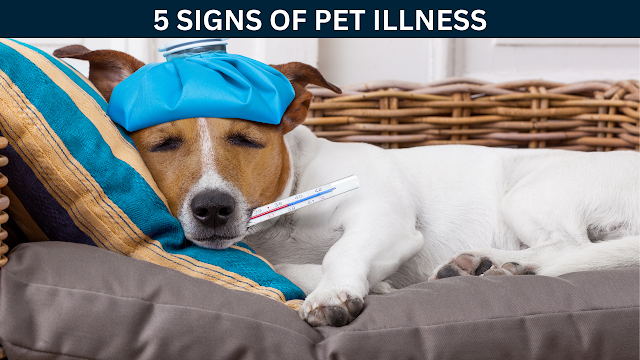5 Signs of Pet Illness and How to Respond
 |
| image: canva |
As pet owners, it's our responsibility to monitor our furry companions for signs of illness. Since pets can't communicate when they're feeling unwell, it's crucial to be vigilant for any changes in behavior or physical appearance. In this post, we'll discuss five common signs of pet illness and provide guidance on how to respond appropriately to ensure your pet receives the care they need.
Changes in Eating or Drinking Habits
Monitoring your pet's eating and drinking habits is crucial for detecting signs of illness. A sudden decrease or increase in appetite or water intake could indicate an underlying health issue. If your pet refuses to eat or drink, it may be experiencing pain, dental problems, gastrointestinal issues, or metabolic disorders. Conversely, excessive eating or drinking could be a symptom of conditions such as diabetes or kidney disease.
Keep a close eye on your pet's food and water consumption, noting any significant changes in behavior. If you notice persistent alterations in eating or drinking habits, it's essential to consult your veterinarian promptly. Early intervention can help identify and address potential health problems before they worsen, ensuring your pet receives the necessary care and treatment to maintain their well-being.
Lack of Energy
If your pet seems unusually lethargic or lacks their usual enthusiasm for activities, it could be a sign of underlying illness or discomfort. Keep an eye out for changes in your pet's energy levels, such as reluctance to play, decreased interest in walks, or excessive sleeping. While pets may have days where they're less active than usual, persistent lethargy lasting more than a day or two warrants attention.
Lack of energy can indicate various health issues, including pain, infection, or organ dysfunction. It's essential to observe your pet closely and note any accompanying symptoms, such as changes in appetite or behavior. If you notice prolonged or significant lethargy, consult your veterinarian for a thorough evaluation. Early detection and treatment of underlying health conditions can help restore your pet's energy levels and improve their overall well-being.
Vomiting or Diarrhea
While occasional episodes of vomiting or diarrhea may be common and usually harmless, persistent or recurrent instances should be taken seriously. Vomiting and diarrhea can be symptoms of various underlying issues, including dietary indiscretion, infections, gastrointestinal diseases, or ingestion of toxic substances.
If your pet experiences frequent vomiting or diarrhea, it's important to monitor their condition closely and consult with your veterinarian for proper evaluation and treatment. Dehydration can quickly become a concern, especially with diarrhea, so it's essential to provide your pet with access to fresh water and, in some cases, electrolyte solutions recommended by your vet.
Your veterinarian can help identify the underlying cause of the vomiting or diarrhea and recommend appropriate dietary changes, medications, or supportive care to help your pet recover and prevent further complications. Prompt veterinary attention is crucial to ensure your pet's comfort and well-being.
Difficulty Breathing or Coughing
Difficulty breathing or coughing in pets should never be overlooked, as they can indicate serious underlying health issues. Labored breathing, wheezing, or coughing could be signs of respiratory problems, heart disease, pneumonia, or other conditions. If your pet exhibits any of these symptoms, it's crucial to seek immediate veterinary attention. Your veterinarian will perform a thorough examination to determine the underlying cause of the respiratory distress and recommend appropriate treatment.
Depending on the diagnosis, treatment options may include medications, oxygen therapy, or supportive care. Prompt intervention is essential to alleviate your pet's discomfort and prevent the condition from worsening. Never attempt to diagnose or treat respiratory symptoms at home, as they require professional veterinary care. By acting quickly and seeking veterinary attention, you can ensure your pet receives the necessary treatment to address the underlying cause and improve their respiratory health.
Changes in Urination Habits
Monitoring your pet's urination habits is essential for detecting potential health issues. Changes in frequency, volume, color, or odor of urine may indicate underlying urinary tract problems, kidney disease, or diabetes. Increased frequency or urgency to urinate could signal a urinary tract infection, while straining to urinate may be a sign of urinary blockage or bladder stones.
Conversely, decreased urination could indicate dehydration, kidney dysfunction, or obstruction. Pay attention to any accidents in the house, excessive licking of the genital area, or vocalization during urination, as these behaviors may also indicate discomfort or pain. If you notice any abnormalities in your pet's urination habits, consult your veterinarian promptly. Early detection and treatment of urinary issues are crucial for preventing complications and ensuring your pet's urinary health and overall well-being.
Conclusion
Being aware of these five signs of pet illness and knowing how to respond promptly can make a significant difference in your pet's health and well-being. Trust your instincts and never hesitate to seek veterinary advice if you suspect your pet may be unwell. Early detection and intervention are key to ensuring the best possible outcome for your furry friend. By staying proactive and attentive to your pet's health, you can help them lead a long, happy, and healthy life by your side.




Comments
Post a Comment